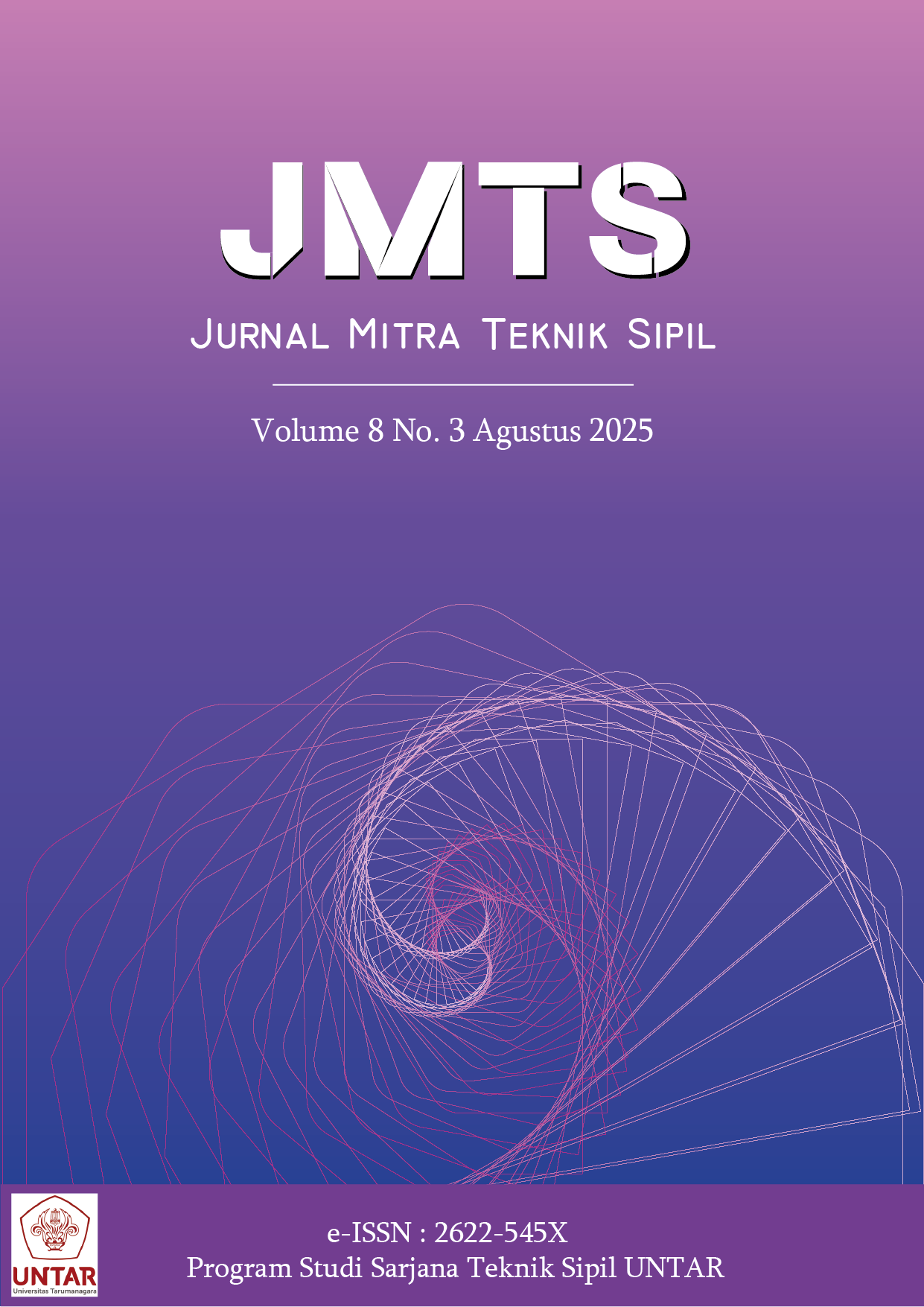ANALISIS PERBANDINGAN METODE EARNED VALUE MANAGEMENT DAN EARNED SCHEDULE PADA PROYEK PEMBANGUNAN DAN RENOVASI RUMAH
Main Article Content
Abstract
The Earned Value Management (EVM) and Earned Schedule (ES) methods are used as project control tools to monitor both cost and schedule performance. This study compares these two methods on two residential projects with less structured project control: the construction of a three-story house in Cakung and the renovation of a two-story house in Mangga Besar. The results of the study indicate different tendencies in the schedule performance assessment between the two methods. In Project 1, observed at week 35, the Schedule Performance Index (SPI) calculated using the EVM method was higher at 0.966 compared to the SPI(t) from the ES method, which was 0.923. This shows that the EVM method estimated a shorter project duration than the ES method. Conversely, in Project 2, observed at week 9, the SPI(t) from the ES method was higher at 0.815 compared to the SPI from EVM, which was only 0.64, indicating that the ES method estimated a shorter project duration than EVM. This difference demonstrates that EVM and ES may yield different assessment tendencies depending on project conditions.
Abstrak
Metode Earned Value Management (EVM) dan Earned Schedule (ES) digunakan sebagai alat pengendalian proyek baik dari segi biaya maupun waktu. Penelitian ini membandingkan antara kedua metode tersebut pada dua proyek perumahan yang memiliki pengendalian yang kurang terstruktur yakni pada proyek pembangunan rumah 3 lantai di Cakung dan proyek renovasi rumah 2 lantai di Mangga Besar. Hasil penelitian menunjukkan bahwa pada proyek 1 seperti di minggu ke-35, nilai SPI yang diperoleh dari metode EVM lebih besar (0,966) daripada nilai SPI(t) dari metode ES (0,923) sehingga estimasi durasi yang diberikan oleh metode EVM lebih cepat daripada metode ES. Sebaliknya, pada proyek 2 seperti di minggu ke-9, nilai SPI(t) yang diperoleh dari metode ES lebih besar (0,815) daripada nilai SPI dari metode EVM (0,64) sehingga estimasi durasi yang dihasilkan oleh metode ES lebih cepat daripada metode EVM. Perbedaan ini menunjukkan bahwa metode EVM dan ES dapat menghasilkan kecenderungan penilaian yang berbeda tergantung pada kondisi proyek.
Article Details
Section

This work is licensed under a Creative Commons Attribution-NonCommercial-ShareAlike 4.0 International License.
This work is licensed under Jurnal Mitra Teknik Sipil (JMTS) Creative Commons Attribution-ShareAlike 4.0 International License.References
Anabel. (2024). Evaluasi Kinerja Proyek Konstruksi dengan Metode Earned Value Management. Karya Mandiri Anabel. Diakses pada 30 April, 2025, dari https://anabel.co.id/2024/08/18/evaluasi-kinerja-proyek-konstruksi-dengan-metode-earned-value-management.
Azwar, A. A. (2021). Analisis Pengendalian Biaya Dan Waktu Menggunakan Metode Earned Value Concept Dan Earned Schedule (Studi Kasus: Proyek Rehabilitas/Pemeliharaan Jalan (Dak) Peningkatan Jalan Dadapan, Pringkuku, Pacitan, Jawa Timur). Skripsi Universitas Islam Indonesia, Yogyakarta.
Iskandar, D. N., Oei, F. J. (2025). Perbandingan Metode Earned Schedule Dan Earned Value Dalam Pengontrolan Proyek Pada Aspek Waktu. JMTS: Jurnal Mitra Teknik Sipil, 8(1),145-158. DOI: 10.24912/jmts.v8i1.30381.
Johari, G. J., & Islami, N. N. (2021). Analisis biaya dan waktu menggunakan metode earned value concept pada proyek Mbe Well Hook Up. Jurnal Konstruksi, 19(1), 325–335.
Melkisedek, J., & Oei, F. J. (2025). Analisis prediksi durasi akhir proyek dengan metode earned value dan earned schedule. JMTS: Jurnal Mitra Teknik Sipil, 7(4), 1377–1388. https://doi.org/10,24912/jmts.v7i4.30380.
Moselhi, O. (2011). The use of earned value in forecasting project durations. In Proceedings of the 28th International Symposium on Automation and Robotics in Construction (ISARC) (pp. 689–693). Seoul, Korea.
Pamungkas, W. I., & Andreas, A. (2021). Analisis biaya dan waktu proyek dalam proses kinerja dengan menggunakan metode earned value. Jurnal Artesis, 1(2), 187–192.
Project Management Institute. (2020). A guide to the project management body of knowledge (PMBOK® guide) (6th ed.). Project Management Institute.
Riza, H. (2021). Triple Constraint dan Pengaruhnya Pada Keberhasilan Proyek. MANPRO. Diakses pada 8 Mei, 2025, dari https://manpro.id/blog/triple-constraint-project-management/.
Salsabilla, K., & Andreas, A. (2023). Analisis pengendalian proyek konstruksi menggunakan metode earned value dan earned schedule, serta manajemen material. Jurnal Artesis, 3(2), 123–132.
Sarjos, L. (2021). Forecasting project performance: Testing Earned Value Management and Earned Schedule metrics using real life project data (Tesis master, Arcada University). Arcada University Repository. https://repository.arcada.fi/handle/123456789/12345.
Silalahi, Y. I., Masthura, L., & Fahriana, N. (2023). Analisis faktor-faktor penentu keberhasilan proyek konstruksi berdasarkan mutu, biaya dan waktu. Jurnal Komposit: Jurnal Ilmu-Ilmu Teknik Sipil, 7(2), 233–240,
Tangtobing, R. F. F., & Waty, M. (2023). Penerapan metode earned value dan earned schedule pelaksanaan proyek rumah sakit X di Bandung. JMTS: Jurnal Mitra Teknik Sipil, 6(2), 237–248.
Weaver, P. (2022). The origins and history of earned value management. PM World Journal, 11(8).
Wilanata, C., & Waty, M. (2024). Analisis metode earned value untuk prediksi penyelesaian proyek konstruksi apartemen X di Tangerang. JMTS: Jurnal Mitra Teknik Sipil, 7(3), 873-884.

